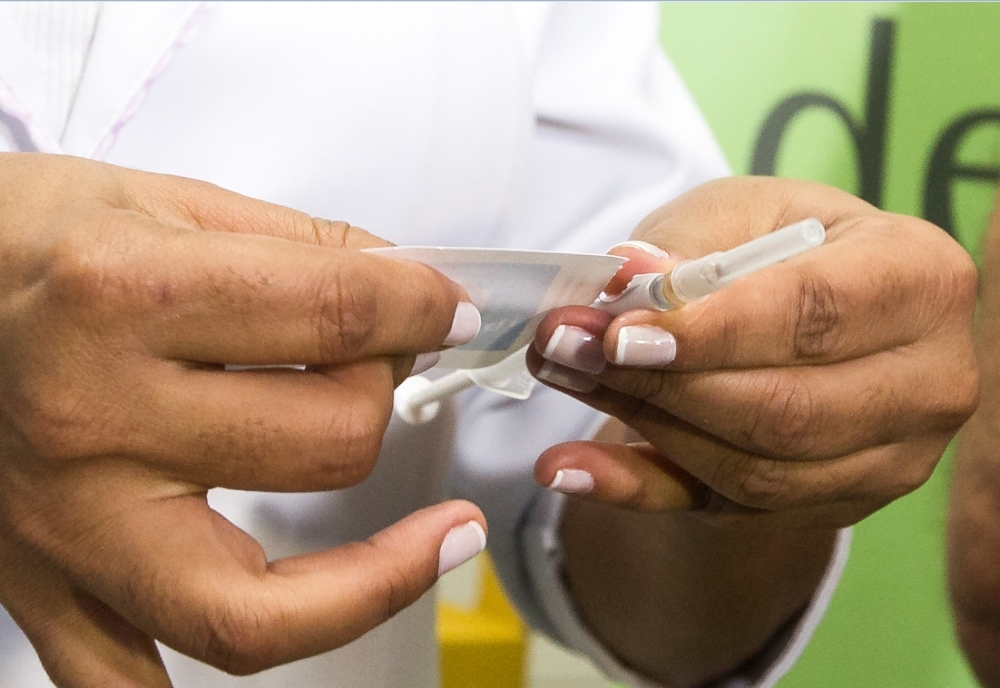

Researchers will monitor volunteers for the vaccine against dengue for five years to assess risk of Zika contagion (photo: Daniel Guimarães)
Researchers will monitor volunteers for the vaccine against dengue for five years to assess risk of Zika contagion.
Researchers will monitor volunteers for the vaccine against dengue for five years to assess risk of Zika contagion.

Researchers will monitor volunteers for the vaccine against dengue for five years to assess risk of Zika contagion (photo: Daniel Guimarães)
By Elton Alisson, in Porto Seguro (Bahia) | Agência FAPESP – Researchers at the Butantan Institute in São Paulo, Brazil, will investigate potential interactions between Zika virus and dengue virus in humans during ongoing clinical trials of the first Brazilian dengue vaccine.
The announcement was made by Paulo Lee Ho, director of the Butantan Institute’s Technological Development & Production Division (DDTP), during a round-table discussion on bottlenecks in the production of dengue, chikungunya and Zika vaccines held as part of the 68th Annual Meeting of the Brazilian Society for the Advancement of Science (SBPC). The meeting took place on July 3-9 at the Porto Seguro campus of the Federal University of Southern Bahia (UFSB).
According to Ho, the study aims to determine whether infection by dengue facilitates Zika contagion due to possible interactions between the two flaviviruses, which are very similar.
“The Phase III clinical trial of the dengue vaccine in humans will be our only opportunity to study possible interactions between dengue virus and Zika virus,” Ho told Agência FAPESP.
The 17,000 volunteers who are taking part in the trial, now underway in 13 cities in all five regions of Brazil, will be monitored by a medical team for five years to make sure the vaccine protects them throughout the period.
During this follow-up stage, the researchers plan to observe whether the volunteers had contact with Zika and if so with what clinical effects.
“We’ll have a chance to find effects that probably wouldn’t be detected without systematic monitoring of these people,” Ho said.
Recently published studies suggest a person infected by dengue may be more vulnerable to Zika because the antibodies produced to combat dengue bind incompletely to Zika virus particles, facilitating Zika’s action. However, these studies were performed in the laboratory using plasma from people infected by dengue and human cell lineages. “Natural infection in humans may happen a bit differently,” Ho said. “If so, we’ll have to develop a vaccine against all four serotypes of dengue plus Zika.”
Zika vaccine
The phase III clinical trial of the dengue vaccine, the final trial, started in early July. The Butantan Institute is developing the vaccine in partnership with the US National Institutes of Health (NIH). It also plans to develop a Zika vaccine. According to Ho, this could be based on a chimera or an inactivated or attenuated virus.
To develop a chimeric vaccine, the researchers plan to substitute dengue virus pre-membrane (prM) protein for Zika virus prM protein.
The inactivated virus vaccine will use noninfectious viruses. The researchers are already trying to grow these in culture medium. If successful, they will purify and inactivate the viruses in the lab.
To produce an attenuated virus vaccine, they plan to modify the genome of Zika virus to weaken its action. “We’re also trying to understand more about Zika’s biology and how it interacts with the host,” Ho said. “And we’d like to contribute not only to serological diagnosis of Zika virus infection, given that we’re producing monoclonal antibodies, but also to treatment using antibodies produced by animals or antivirals.”
As part of its plan to develop an inactivated virus Zika vaccine, in the end of June, the Butantan Institute signed a partnership agreement with the Biomedical Advanced Research & Development Authority (BARDA), an agency of the US Department of Health & Human Services (HHS) (read more in Portuguese at agencia.fapesp.br/23455).
In the same time period, in an article published in the journal Nature, a group of Brazilian and US researchers announced the development of vaccine formulations that combined modifications to Zika’s prM protein and external envelope (Env) protein and that protected mice against infection by the virus.
The group also produced a purified inactivated virus vaccine that successfully protected mice against Zika as measured by the absence of detectable viremia, i.e., progression of viral load (read more at agencia.fapesp.br/23460).
“The results of this study are very important and will help us develop our Zika vaccine,” Ho said.
In Brazil, the trials were performed under the aegis of the Zika Virus Research Network in São Paulo (Rede Zika), with FAPESP’s support.
The initial studies that resulted in the development of a dengue vaccine by the Butantan Institute were also supported by FAPESP.
Republish
The Agency FAPESP licenses news via Creative Commons (CC-BY-NC-ND) so that they can be republished free of charge and in a simple way by other digital or printed vehicles. Agência FAPESP must be credited as the source of the content being republished and the name of the reporter (if any) must be attributed. Using the HMTL button below allows compliance with these rules, detailed in Digital Republishing Policy FAPESP.




